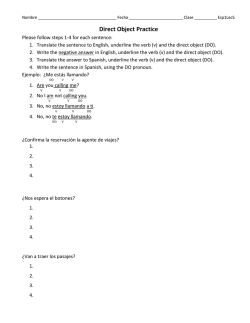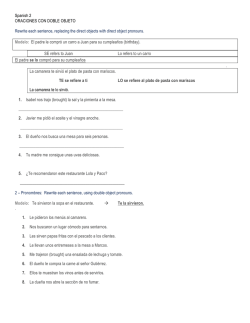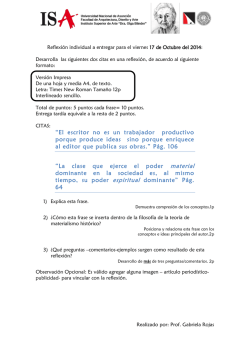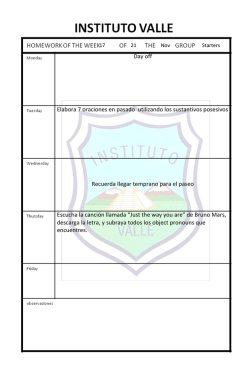
Direct Objects/Direct Object Pronouns El Objeto Directo
Nombre: __________________________________ Fecha: _____________________ Direct Objects/Direct Object Pronouns El Objeto Directo/Los Pronombres de Objeto Directo…. Things to keep in mind/Recuerda 1.The direct object in a sentences takes the action of the verb 2.The direct object of a sentence agrees in gender and number with the noun it/they modify. 3. A direct object pronoun will replace the direct object in a sentence 1. El objeto directo en una frase recibe la acción del verbo. 2. El pronombre objeto directo en una frase concuerda en género y número con el sustantivo que reemplaza. 3. El pronombre objeto directo REEMPLAZA el objeto directo en una frase. What????....I mean, ¿Qué?????? In English, we use direct object pronouns to replace direct objects all the time without even realizing it. When we do this, we simplify language and avoid repetition. Substituting the DO with the DOP looks like this in English… En ingles, usamos pronombres objeto directo para reemplazar el objeto directo todo el tiempo sin darnos cuenta. Cuando hacemos eso, simplificamos el lenguaje y evitamos repetición. En ingles, así es como substituimos el Objeto Directo (OD) con el Pronombre Objeto Directo (POD) I like ice creamÆ I like IT. We eat cookies on TuesdaysÆWe eat THEM on Tuesdays. He calls the girlÆ He calls HER. She calls the boyÆ She calls HIM. ©abcteach.com 1 Nombre: __________________________________ Fecha: _____________________ 2 ***IT, THEM, HER, and HIM are all direct object pronouns IT,THEM,HER y HIM son pronombres objeto directo In Spanish, the key to replacing the DO with the DOP is simple. Just follow the steps below/En español, el truco para reemplazar el OD por el POD es simple. Simplemente tienes que seguir los siguientes pasos. 1. Read your sentence and figure out what it is saying in Spanish/Lee la frase y tradúcela. 2. Locate the verb in that sentence and ask a “what” or a “who” question about the verb—the answer to this question will help you locate the DO/Encuentra el verbo en la frase y pregúntate “qué” o ”quién” recibe la acción del verbo-la respuesta te ayudará a encontar el OD. 3. Take the DO out of the sentence and look at this handy little chart to figure out what pronoun will replace the object you have just thrown out of the sentence/Saca el OD de la frase y mira en la siguiente tabla para ver que pronombre reemplazará el objeto que acabas de echar de la frase. Masculine/Masculino Feminine/Femenino Singular Plural LO LOS LA LAS 4. Take that pronoun, and place it into your old sentence. Where? “Directly in front of the conjugated verb… ¡Olé!/Toma el pronombre y ponlo en la frase. ¿Dónde? “Directamente en frente del verbo que está conjugado ©abcteach.com Nombre: __________________________________ Fecha: _____________________ DIRECT OBJECT/OBJETO DIRECTO PRACTICE/PRÁCTICA Let’s work with some examples to figure this out. Follow the steps above/Practiquemos con algunos ejemplos. 1. Yo compro la pulsera. 2. Ella necesita el chocolate. 3. Ustedes visitan a los chicos. 4. Tengo que comprar los aretes. 5. ¿Llevas la bufanda cuando hace frío? 6. Comemos pizza en la fiesta. 7. Ellas venden zapatos y los pantalones. 8. Llamo a mi abuela. 9. Escribo una carta a mi amiga Luisa. 10. Tengo dos discos compactos nuevos. 11. Quiero estudiar matemáticas después de la escuela. 12. ¿Puedes traer una limonada? 13. ¿Vamos a visitar a mis tíos? 14. Elena busca un regalo para su madre. ©abcteach.com 3 Nombre: __________________________________ Fecha: _____________________ RESPUESTAS: 1. Yo LA compro. 2. Ella LO necesita. 3. Uds. LOS visitan. 4. LOS tengo que comprar. 5. ¿LA llevas cuando hace frío? 6. LA comemos en la fiesta. 7. Ellas LOS venden. 8. LA llamo. 9. LA escribo a mi amiga Luisa. 10. LOS tengo. 11. LAS quiero estudiar. 12. ¿LA puedes traer? 13. ¿LOS vamos a visitar? 14. Elena LO busca para su madre. ©abcteach.com 4
© Copyright 2026




